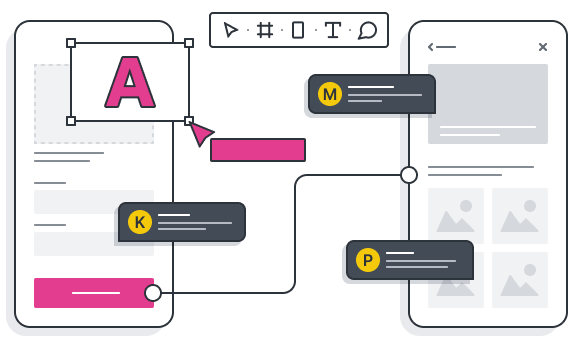If you’re looking for a tech job, you might be inclined to focus solely on tech companies—but there are so many opportunities beyond the tech industry that you could be missing out on.
Whether you’re a tech newbie or a senior expert, sectors like government, healthcare, and non-profit are all in need of your valuable skills. Now is a great time to diversify your job search, and we’ll share some actionable strategies to help you do so.
In this blog, we will cover:
- Expanding your job search beyond the tech industry is a smart strategy—here’s why
- How to find a tech job in a different industry: 5 actionable steps
- What industries are hiring tech professionals right now?
- Finding a tech job in a different industry: The best job boards
- The big takeaway
Let’s start with why should you consider a job outside of the tech sector.
Expanding your job search beyond the tech industry is a smart strategy—here’s why.
Since the end of 2022, mass layoffs at big tech companies have been making headlines and causing great uncertainty in the field.
It’s important to be clear that the big tech layoffs don’t automatically spell bad news for all tech workers, or for the industry at large. The global tech market is still growing, and tech jobs are projected to grow at almost double the rate for other jobs over the next ten years. But, if you do find that jobs at tech companies are limited right now, expanding your search to other industries may prove crucial for landing your next role.
Another trend worth noting: demand for tech skills is growing in certain industries outside of tech. Handshake, an early career community in the US, reports that tech graduates are increasingly applying for jobs within the government, healthcare, and non-profit sectors.
Why? Well, as technology advances, companies are doubling down on their efforts to adopt new technology—both to boost internal efficiency and to provide a better user experience for their customers or clients.
Tech skills are crucial here. All sectors need designers, engineers, analysts, and product experts to thrive in the digital era. This is excellent news for tech professionals whose skills are in high demand.
When you diversify your job search, you’ll discover more opportunities—and maybe even better ones. You’ll have the chance to learn new skills, to gain experience in a different environment, to navigate new challenges, and grow highly adaptable in the process. That’s pretty valuable for your career!
How to find a tech job in a different industry: 5 actionable steps
Ok, so applying for roles in different industries sounds good. But, with little to no experience outside of tech, where do you start? How do you put together a convincing application?
Here’s how to find a tech job in a different industry.
1. Explore industries that interest you
Begin your job search from a place of curiosity. What industries interest you? What products, services, or sectors would you like to learn more about? Where would you like to make an impact?
While you want to expand your job search, it’s important to focus on industries that truly excite you. This will make it easier to convey genuine enthusiasm for the role and give a convincing interview.
2. Research your target industries
Once you’ve identified the sectors you’re interested in, develop some industry-specific knowledge. In particular, explore trends currently shaping the industry, as well as how technology is impacting that particular field.
Likewise, understand what challenges and pain-points the industry is facing, especially in relation to technology. This will enable you to speak knowledgeably with potential employers—and to demonstrate how your tech skills will help them address specific challenges.
3. Market your transferable skills
Tech skills are just one piece of the puzzle. To market yourself in non-tech industries, you’ll also need to highlight your transferable soft skills. Emphasise skills that are valuable in any industry, such as leadership, communication, empathy, and project management.
In particular, demonstrate your adaptability. Use the STAR framework to prepare anecdotal examples of times when you’ve had to be flexible or versatile. This could be working with clients from different industries or having to quickly learn new skills when taking on an unfamiliar project.
If you can show employers that you’re able to learn and adapt, they’ll be more willing to welcome you into a new industry.
4. Network
As you explore opportunities in other sectors, focus on growing and diversifying your professional network.
Follow and connect with people who are active in your target industries. This will give you insight into what’s happening in the field and deepen your understanding of current challenges.
Growing your network may also give you access to interesting roles. Many jobs nowadays are posted from personal LinkedIn accounts, so keep your eyes peeled as you scroll through your feed.
5. Tailor your application to each role
This goes for any job, but it’s especially important when applying for roles outside of tech. You may have to work a little harder to demonstrate your suitability for jobs in a new field, so your application package must be specific.
For every job ad, identify the key skills they’re looking for—both technical and soft—and emphasise those in your resumé. Write a unique cover letter for each job, explicitly expressing your interest in that particular company, product, and industry, and, most importantly, why and how you’ll bring value to that particular role.
The more effort you put into tailoring your application, the more convincing it’ll be—increasing your chances of getting an interview and landing the job.
What industries are hiring tech professionals right now?
In the era of rapid digital transformation, tech skills are required pretty much everywhere. Here are some of the fastest-growing industries in the world where jobs, including tech roles, are on the rise.
- Healthcare. In 2021, the global healthcare market was valued at 10.3 trillion USD. By 2030, it’s projected to reach 21.06 trillion USD—a compound annual growth rate (CAGR) of 8.27%. The smart healthcare market (think mobile apps, remote health services, at-home tests, and medication delivery services) is expected to grow at an annual rate of 12.8% from 2023 to 2030.
- Financial services. The global financial services market grew from 25848.74 billion USD in 2022 to 28115.02 billion USD in 2023 at a compound annual growth rate (CAGR) of 8.8%. By 2027, it’s expected to reach 37484.37 billion USD. Technology is a driving force in the industry (think mobile banking, cybersecurity, accounting software, and so on), making this a promising sector for tech workers.
- Personal care and service. This includes professional services in beauty, fitness, well-being, and mental health. In 2023, revenue in the global beauty and personal care market amounts to 579 billion USD. The market is expected to grow annually at a rate of 3.53% between 2023 and 2028. Interestingly, an estimated 27.5% of total market revenue is generated through online sales in 2023—highlighting the need for reliable technology and well-designed user experiences.
- Human resources (HR). The global human resource management market is expected to grow at a compound annual growth rate (CAGR) of 12.7% between 2023 and 2030. The demand for human resource management software is also expected to grow as companies seek to integrate predictive analytics and automate certain processes. Again, skilled tech professionals will be integral to the development and adoption of such technologies.
- Travel, leisure, and hospitality. From 2023-2027, annual revenue in the travel and tourism market is expected to grow at a rate of 4.42%. By 2027, it’s estimated that 74% of the total market revenue will be generated through online sales. Tech skills will inevitably have a crucial role to play here.
Finding a tech job in a different industry: The best job boards
In addition to generic job sites like LinkedIn and Indeed, it’s also worth exploring industry-specific job boards. Here are some useful platforms for finding tech jobs within the fast-growing industries we outlined in the previous section.
- Health Tech Nerds Job Board—for those passionate about building a better healthcare system. You can filter your search based on your area of interest (e.g. “design”, “product”, or “software engineering”). Many of the jobs featured are remote.
- Digital.Health. In amongst the clinical roles, you’ll also find jobs related to product management, engineering, research, and design within the healthcare sector.
- BuiltIn—a broad job platform covering sectors such as healthtech, fintech, edtech, and many more, including remote, hybrid, and in-office opportunities.
- FinTech Jobs. Search for relevant jobs based on keywords such as “UI designer” or “product designer” to find opportunities within the financial sector.
- Fintechfans—a job board with opportunities in design, data, product, IT, and more, all within the financial services industry.
- TrueUp—the world’s largest FinTech job marketplace, listing roles in design, engineering, data analytics, data science, and more, both remote and in-house.
That’s just a handful of job boards to get you started. Whatever industry you’re interested in, explore specific job boards within that sector in addition to filtered searches on more generic job sites.
The big takeaway
Whether you’re a UX designer, a UI designer, a UX researcher, an analyst, an engineer—or a t-shaped professional spanning multiple disciplines—your tech skills are in high demand. Expand your job search beyond the tech industry to learn new skills, take on fresh challenges, and shape some of the most impactful products, services, and experiences required by users today.
For more career and hiring insights, read up on the state of UX hiring in 2023, learn how to recognise UX maturity while job hunting, or discover how to create a winning UX CV and cover letter.





